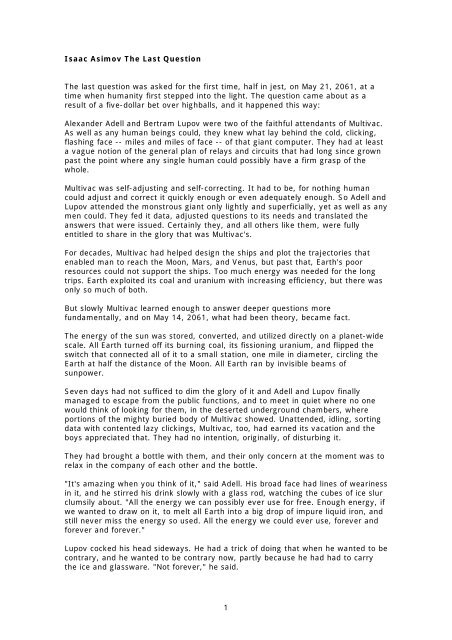

At some point, we’re going to be called IG-73 and then it’s going to morph into a hive mind.” Mary wonders at the exceptional nature of what makes up the human experience, and Nathan highlights that the end of the story provides a kind of hope, that there is a circularity there, the universe is coming back. Join us as we tangle with this complex philosophical and engrossing scientific question-as Laura insists we’re not just data, that we have a physical life, Daniel ponders the merged consciousness at the end of the story, and Cezary warns, “If you’re looking for an individual consciousness here-not gonna happen. It’s a short piece but packs a punch, with a comic ending that inspires rumination.

There is as yet insufficient data for a meaningful answer. In each phase, a human asks the Multivac if it’s possible to reverse the entropy of the universe-how to stop its seemingly inevitable death, save the universe, save humanity. It follows the evolution of his enduring conception, the computer Multivac, through six phases of space and time, and humanity’s relation to it. This is one of Asimov’s most famous short stories and his personal favorite. Is there a way to hold off or reverse the inevitable?Ī testament to this primary apprehension is “The Last Question” by Isaac Asimov, a short story we discussed a few years back (after which the resultant sound files had their very own group entropic episode, only recently resurrected). Gale rated the collection four+ stars out of five, writing that "few other authors can claim consistently high level of excellence" and mentioning "Profession" and "The Ugly Little Boy" as especially good.Podcast (phi-fi-podcast): Play in new window | Download (Duration: 45:55 - 42.2MB)įrom Ponce de León to Woody Allen (and likely every self-reflective person who has lived), entropy has been at the root of human anxiety.

The pieces were all originally published in magazines between 19, with the exception of the closing poem, "Rejection Slips", which was original to the collection. Nine Tomorrows is a collection of nine short stories and two pieces of comic verse by American writer Isaac Asimov.


 0 kommentar(er)
0 kommentar(er)
